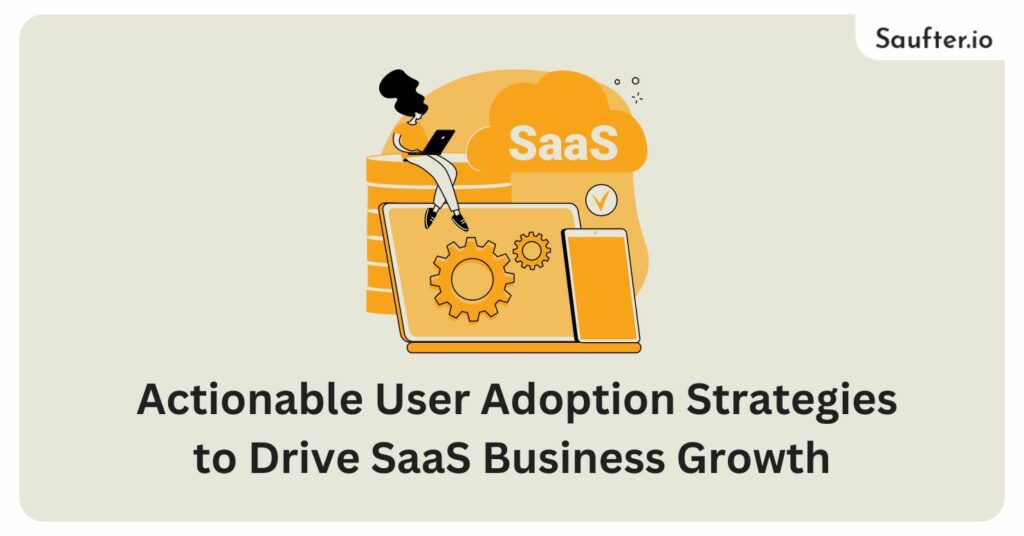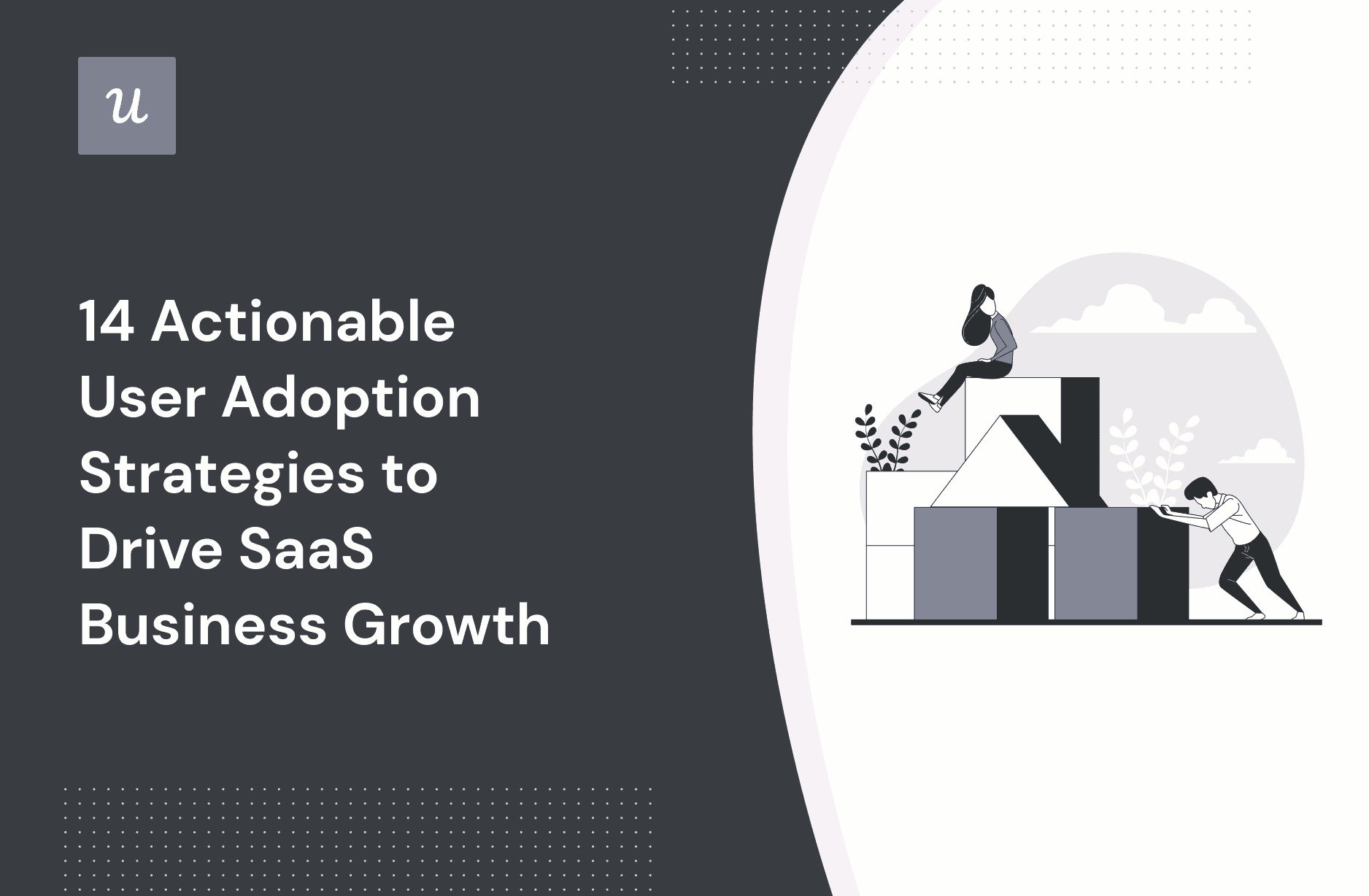Last Updated: January 2026
For SaaS businesses, user adoption is key to driving growth and retention. According to research, companies with a well-planned user adoption strategy experience a 70% improvement in customer engagement within the first six months. This increase in engagement helps create lasting relationships and directly impacts retention rates.
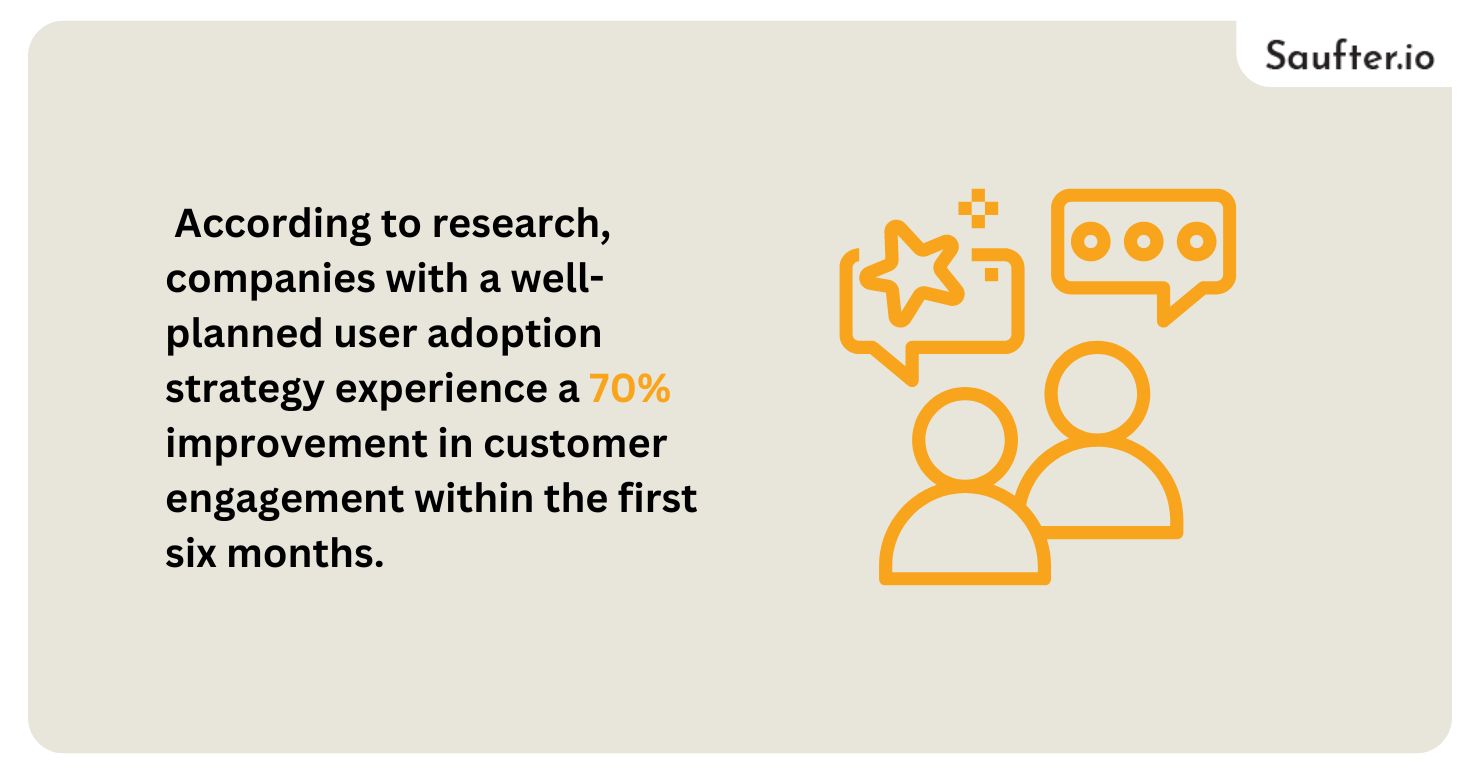
To ensure the success of your SaaS business, it’s important to have an actionable plan to guide users through onboarding and beyond. In this blog, we’ll cover 14 effective strategies to boost user adoption, engagement, and ultimately business growth.
Table of Contents
- Personalize the User Experience
- Utilize Interactive Product Tours
- Onboarding Checklists for Success
- Incorporate Gamification
- In-App Messaging for Contextual Help
- Gather User Feedback
- Communicate Feature Updates
- Share User Success Stories
- Multi-Channel Support
- Offer Educational Resources
- Use Analytics to Track User Behavior
- Celebrate User Milestones
- Encourage User Referrals
- Track Key Performance Indicators (KPIs)
- How to Choose User Adoption Strategies to Drive SaaS Business Growth?
- Saufter for AI-powered Chatbot
- Conclusion
1. Personalize the User Experience
Personalization is one of the most effective ways to make users feel connected to your product. A tailored user adoption strategy helps align product features with user needs, delivering a customized experience based on behavior or role. By providing the most relevant tools and content, users can see value faster and are more likely to continue using the product long-term.
2. Utilize Interactive Product Tours
Interactive product tours are a great way to introduce users to key features and ensure they understand the software. A good user adoption strategy incorporates step-by-step guides that allow users to learn by doing, making them more comfortable with your product. This hands-on approach can significantly reduce churn rates by ensuring users quickly grasp the value of the product.
3. Onboarding Checklists for Success
A checklist will help users monitor their progress during onboarding, thus, they will be able to complete all the necessary steps for successful goal achievement. This user adoption strategy engages users by deconstructing the onboarding process into specific tasks that can be easily completed step by step, thus making it easier to find and navigate the product and feel like they have achieved something.
4. Incorporate Gamification
Gamification is a method of engaging the user journey through the use of rewards for specific actions. Whether it’s doing onboarding, learning new features, or reaching usage goals, gamification is what keeps users involved. This user adoption strategy works even better with the effectiveness of the users remaining motivated to try more product features that are advanced.
5. In-App Messaging for Contextual Help

Real-time support via in-app messaging is a very useful tool in your user adoption strategy. When the users are stuck or need help, the in-app context-sensitive help will allow them to be guided through the issue without disturbing their workflow. This not only helps them to stay connected but also ensures that they don’t get stuck at any stage of their journey.
6. Gather User Feedback
User feedback is invaluable when improving a product. The feedback obtained from time to time will help you to spot the pain points and deficiencies that need to be worked on, which in turn, will enable you to recalibrate your user adoption plan accordingly. More importantly, the users are acknowledged, thus leading to higher loyalty and retention if they know that their ideas are taken into consideration.
7. Communicate Feature Updates
Trailing the users about new product features and improvements is a good approach to engage them. Feature upgrades can breathe new life into your product and guide users to the use of new offerings that could bring out a better experience. A thriving user acceptance strategy requires regular and consistent communication through emails, in-app notifications, and webinars so that users may be apprised of changes and restorations.
8. Share User Success Stories
One of the best methods of user adoption is to give examples that share or demonstrate successful cases. When users get to see the accomplishments of your products by others in a real-life situation, it makes them believe that they will get the same results; therefore, trust is built, and they can see the value in your solution. Besides, these are the perfect success stories in the software, which is effective in all possible cases and which can successfully guide programmers in their development.
9. Multi-Channel Support
Motivate Electric through different platforms guarantees that the customer can get the help he needs regardless of the preferred method of communication. Chat is the most preferable choice of communication; however, a user can also send an e-mail or ask questions on a Contact Us page. Also, the FAQ page and the knowledge base should be included in their user adoption method and also allow users to go through the solution on their own.
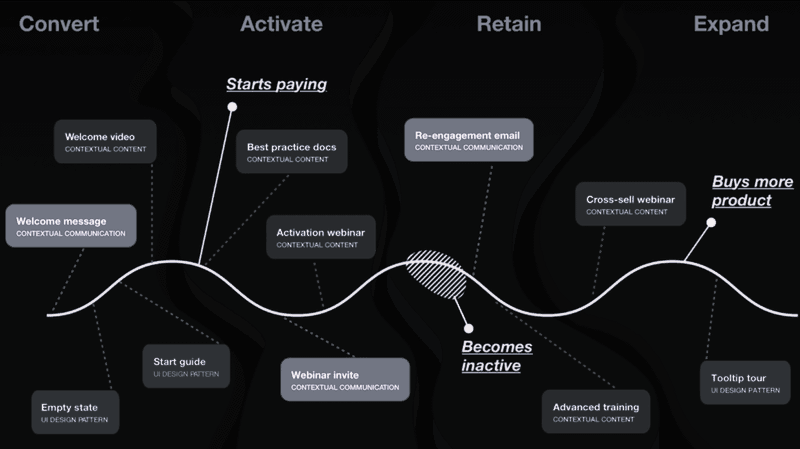
10. Offer Educational Resources
Beyond onboarding, users should have access to educational content that helps them master your product. Tutorials, webinars, blogs, and video content can all be part of your user adoption strategy. By continually educating users, you can ensure they stay engaged with the product and continue to see its value over time.
11. Use Analytics to Track User Behavior
Monitoring user behavior through analytics can give you deep insights into how users are interacting with your product. This data can guide your user adoption plan by highlighting which features are being underutilized or where users tend to drop off. With these insights, you can take proactive steps to adjust onboarding or provide additional guidance.
12. Celebrate User Milestones
Recognizing key milestones in a user’s journey—such as successful onboarding or fulfilling the requisite milestones motivates them to engage with your product consistently. Simple gestures of congratulation or offering small rewards can greatly induce users to explore more of their product. These milestones boost a participant’s morale to bond positively with the users.
13. Encourage User Referrals
Satisfied customers are invaluable marketers for your venture. Introduce a referral program that rewards customers who promote your product and powers organic growth, bolstering their loyalty. This user adoption strategy capitalizes upon the existing satisfaction of its users to recruit new customers, rewarding such customers for their recommendations.
14. Track Key Performance Indicators (KPIs)
Consider metrics like user engagement rates, time-to-value, or retention to understand user adoption. Tracking continuous metrics utilities to improve your strategies from time to time, making sure your users are not adopting only but sticking around, and being satisfied as well.
How to Choose User Adoption Strategies to Drive SaaS Business Growth?
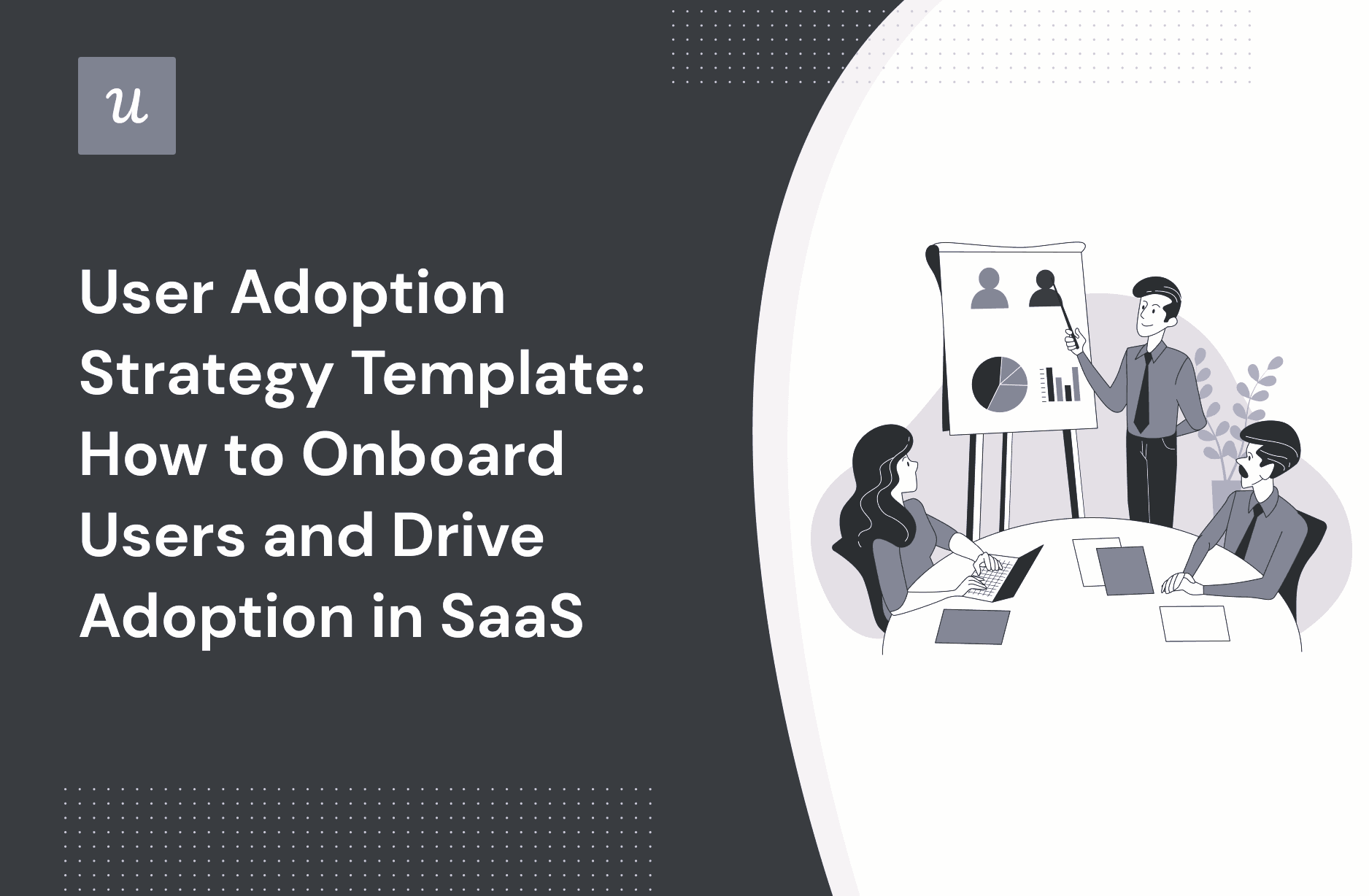
There is no one-size-fits-all user adoption strategy that will work for every SaaS product. It will always depend on the complexity of your product, the goals of your users, and the size of your support team. However, you can certainly test and choose the best SaaS product adoption strategy that suits your business.
Below are key steps you’ll need to take to get there:
- Know Your User Base: First and foremost, figure out the various types of users that will belong to your product and understand their goals, their pain points, and their learning styles. Then you can tailor your user adoption strategy to meet those needs.
- Think About Product Complexity: A more complicated product will need you to have a very strong user adoption strategy. If your product has multiple advanced features, you’re going to need guided walkthroughs or educational content to guide users through the learning curve.
- Consider Support Capabilities: If your support team is small, think of investing in self-help tools such as a knowledge base or an in-app messenger. If you have a larger support team, offering personalized onboarding sessions, or even dedicated success managers can be an easier pill to swallow.
- Iterate Based on Feedback: You’re most probably not going to get everything right on the first attempt, and that’s just fine. Use the feedback from your users to inform your decision and change your user adoption strategy. An iterative approach to user adoption strategy allows you to constantly change and adapt based on learnings of what works for your users and what doesn’t.
Let us now introduce you to the best customer service platform:
Saufter for AI-powered Chatbot

Saufter is an innovative platform specifically designed to build AI-powered chatbots. It combines an intuitive user interface with advanced AI capabilities, making it ideal for beginners and experts alike.
- User-friendly Interface: Saufter’s drag-and-drop editor allows for quick and easy chatbot design without any coding skills required.
- Advanced AI Capabilities: With built-in machine learning and natural language processing, Saufter can understand and respond to complex user queries effectively.
- Integration Flexibility: Saufter supports integration with multiple platforms, including websites, social media, and messaging apps, ensuring your chatbot is available wherever your customers are.
- Analytics and Feedback: Saufter provides comprehensive analytics and feedback tools, helping you continuously improve your chatbot’s performance.
Conclusion
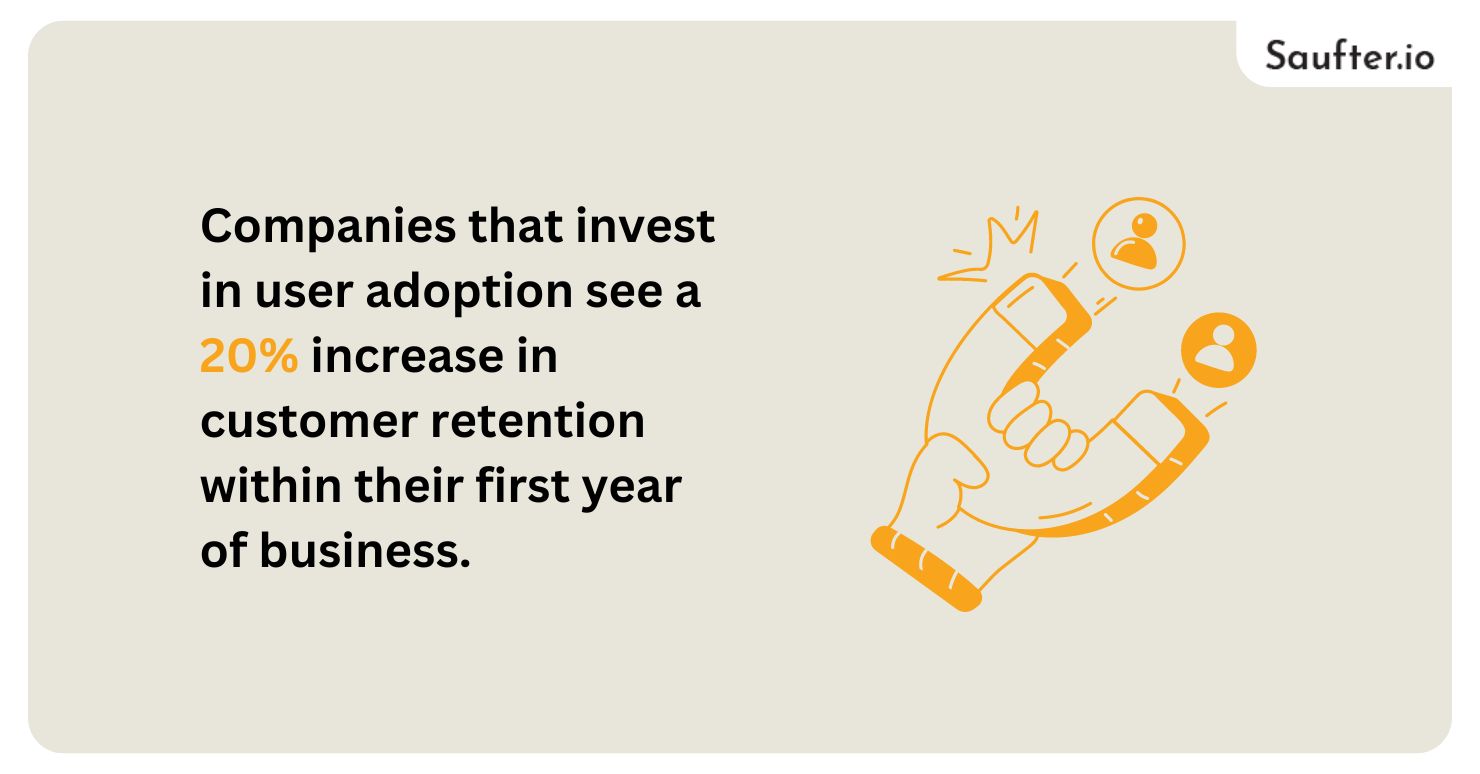
Implementing a solid user adoption strategy is crucial to the growth and retention of users in the SaaS industry. Companies that invest in user adoption see a 20% increase in customer retention within their first year of business. By focusing on personalized onboarding, continuous user education, and actively responding to feedback, SaaS businesses can ensure their users not only adopt their product but also remain loyal for the long haul. By following these 14 actionable strategies, you can help your users realize the full value of your product, resulting in sustainable business growth and success.
